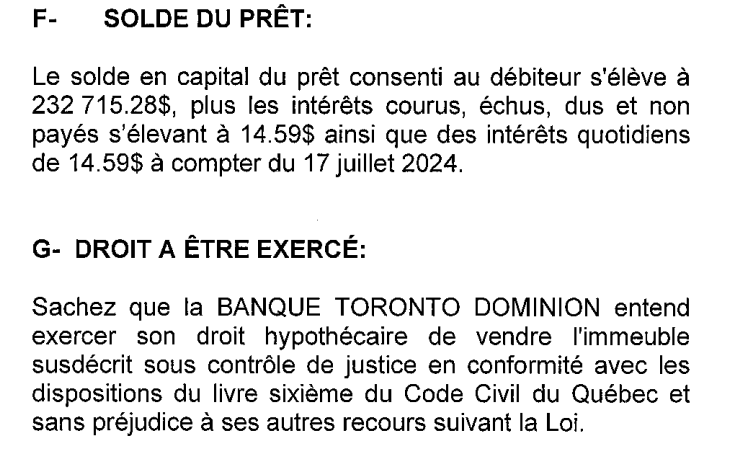EDITOR’S NOTE: This story has been updated to add new information from Nikolay Goltsev’s lawyer, including details of the Goltsev family’s dealings and discussions with TD Bank.

TD Bank is moving to seize the Quebec home of a Russian-Canadian convicted in New York for conspiring to secretly ship more than $10 million in restricted electronics to the Kremlin for use in weapons systems in its Ukraine war, Global News has learned.
Toronto-based TD has filed a 60-day notice of its intention to foreclose on the Ste. Anne-de-Bellevue residence of Nikolay Goltsev, 38, who sits behind bars in New York and awaits sentencing.
City of Montreal property assessment records say the home he shared with his wife Kristina Puzyreva until their arrests in 2023 has a market value of $848,800. So far, it does not appear to be for sale.

The foreclosure comes as TD negotiates with the U.S. Department of Justice and other American financial regulators to pay up to U.S. $4 billion in penalties for multiple money-laundering lapses and announced plans last week for its CEO to retire and be replaced in 2025.
U.S. officials have investigated and accused TD’s American affiliate of having lax anti-money-laundering controls and detection systems within at least four branches in New York, New Jersey and Florida that allowed criminals like Goltsev and his wife to use TD to facilitate crimes.
In June, Bloomberg News revealed one case featured a TD USA banker in Florida taking $200 bribes to look the other way on a Columbian drug trafficking ring’s money laundering, including by providing falsified records, opening dozens of accounts to help criminals flow their cash across borders.
In May, The Wall Street Journal reported a Justice Department probe into TD Bank’s internal controls was focusing on how Chinese crime groups and drug traffickers used TD to launder money from its U.S. fentanyl sales. That probe was launched after FBI agents allegedly uncovered a New York and New Jersey operation that laundered hundreds of millions of dollars from illicit narcotics through several TD branches and other banks, with traffickers greasing bankers with at least $57,000 in gift cards, The Journal reported.
TD Bank corporate spokesperson Elizabeth Goldenshtein declined to discuss specifics of Goltsev’s case in New York or the bank’s foreclosure action on his Quebec home.
“While we would not comment on any customer details due to our confidentiality policy, I can confirm that this case is not related to our ongoing AML matters in the U.S,” Goldenshtein stated.

Get breaking National news
On July 11, Goltsev entered a guilty plea after reaching a deal with prosecutors with the U.S. attorney for the Eastern District of New York. Investigators seized TD Bank records south of the border, court records show.
Prosecutors sealed those, so it is difficult to know how much money sloshed through the TD account.
Goltsev’s plea agreement shows he agreed to forfeit and pay U.S. $4 million and surrender assets worth another U.S. $1.68 million seized by FBI and Homeland Security investigators.
He also agreed not to appeal any sentence he may get that is 46 months in jail or less, a copy of the plea deal shows. Goltsev also agreed to be deported from the United States, possibly to be returned to Canada or Russia, a copy of the plea agreement shows.
On July 17, TD Bank filed its notice of intent to foreclose on the businessman’s Ste-Anne-de-Bellevue, Que., home. A lawyer representing TD said in the filing the jailed Russian-Canadian businessman owes the bank $232,715 on a home equity line of credit portion of a $450,000 mortgage.
Goltsev signed the mortgage with a TD Montreal branch to buy the home in 2015.
Goltsev has failed to make payments since TD cancelled the HELOC portion of his loan and demanded full repayment on June 28, TD lawyer Olivier Therrien said in the 60-day notice.
A bailiff served the 60-day foreclosure notice on Goltsev’s mother-in-law, Russian national Snezhana Puzyreva, who also was living in the residence with another man who was her partner when Global News visited the property this summer, documents show.
Since this story was first published, Alexandre Cayer, a lawyer for Goltsev, sent a letter to Global News.
Cayer stated that the reason why Goltsev could not pay his outstanding mortgage is because TD Bank had frozen and closed his accounts.
Cayer also stated that Goltsev’s TD Bank account in Canada was not closed because of his arrest and guilty plea in the U.S.
(Major Canadian banks regularly freeze and close accounts when clients like Goltsev have been arrested and charged with money laundering and other crimes in Canada or elsewhere, to reduce reputational risk.)
Goltsev’s wife, Kristina Puzyreva, was also charged in the technology smuggling scheme. She pleaded guilty to a money laundering conspiracy charge. She was sentenced to two years in jail this summer.
TD has given Goltsev and Puzyreva’s family 60 days to vacate the home or face court-ordered eviction and judicial repossession.
But Cayer said Goltsev’s mother-in-law is now in discussions with TD about how she can pay his outstanding mortgage balance with a bank draft from another unidentified institution to stop the foreclosure proceedings.
Using aliases like “Nick Stevens” or “Gio Ross,” Goltsev and Puzyreva and other members of their conspiracy admitted to buying electronic components from major U.S. manufacturers and distributors using front companies, SH Brothers and SN Electronics.
They were buying restricted technology components that could be used for both civilian and military purposes.
The group coordinated more than 300 shipments of restricted electronics that later went to Russian defence contractors and were used on the Russian battlefield to kill Ukrainians, documents show.
FBI and U.S. Homeland Security investigators gathered text messages and banking records which showed Goltsev and Puzyreva knew the technology was being used exclusively for military hardware and lied about it.
Goltsev and his co-conspirator, Salimdzhon Nasriddinov, used front companies in Turkey, China and Hong Kong, India, and United Arab Emirates. Packages were then rerouted to Russia, prosecutors said.
Prosecutors collected evidence showing some electronic components and integrated circuits shipped by Goltsev were later found in seized Russian army Ka-52 attack helicopters, Orlan-10 unmanned aerial vehicles (UAVs), and T-72B3 battle tanks and Izdeliye 305E guided missiles.
More electronic parts were found missile defense and electronic warfare intelligence systems.
The U.S. prosecutors said Puzyreva operated the numerous bank accounts and conducted financial transactions to further the group’s scheme.

She told her husband Goltsev at one point they were raking in so much cash they would be rich.
A U.S. judge will sentence Goltsev on December 10, 2024. He faces up to 20 years in prison.














Comments